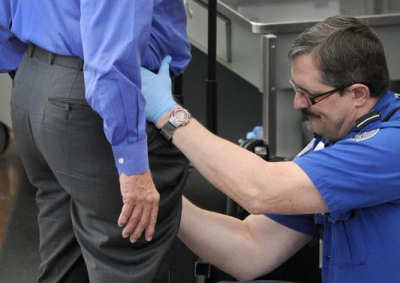Harvard Law students sue TSA over intrusive searches at airports

Two Harvard Law students are suing the TSA in federal court over its new, “enhanced pat downs” and naked body scans, claiming a Fourth Amendment protection against unlawful searches and seizures. Jeffrey Redfern and Anant Pradhan filed the lawsuit Monday in the District Court of Massachusetts following a TSA encounter in November.
While flying out of Logan International, the pair opted out of a dose of ionizing radiation and agreed to be searched by hand. Pradhan said a TSA employee groped his groin, lifted his buttocks and placed his fingers inside the waistband of his pants.
"They run their hand all the way up , and they don't necessarily stop," he said. "They'll go all the way up until – well, they go all the way up."
The Harvard Law Record has the story:
“The lawsuit claims the mandatory screening techniques violate the students' Fourth Amendment right against unreasonable search and seizure. The suit seeks a permanent injunction against the use of either screening method without reasonable suspicion or probable cause and a declaratory judgment stating that mandatory screening using these techniques is unconstitutional where probable cause or reasonable suspicion do not exist. Redfern and Pradhan have also asked for an injunction that would prevent the TSA from storing any images taken using the full-body scanners except as needed to prosecute suspected terrorists.”
At issue in the case are the 17 full body scanners employed at Logan airport to screen passengers for explosive or incendiary devices. The TSA has deployed 450 full-body scanners throughout the country since March. Hundreds more have been ordered by local and state authorities for government buildings and by companies in the transportation industry.
The complaint names Secretary of Homeland Security Janet Napolitano and TSA Administrator John Pistole as defendants. It is one of several suits against the agency that has cropped up in recent weeks including at least two by other travelers from Florida and Arkansas. Two commercial airline pilots have also brought suit on Constitutional grounds.
Some legal experts have chimed in on the matter. Orin Kerr, a professor at George Washington University Law School and co-author of a prominent casebook on criminal procedure said the students' case faces an “uphill battle.” The basic legal justification behind the TSA's procedure is that it is an “administrative search” and is:
“constitutional so long as it is reasonable — and that it is reasonable so long as it is not overly invasive given the threat that it is designed to deter and stop," Kerr wrote in a legal blog.
The Record continues:
“Redfern and Pradhan believe the technology is overly invasive and ineffective. Their complaint alleges that the TSA erred in justifying the new techniques by pointing to the example of Umar Farouk Abdulmutallab, the so-called "Underwear Bomber" of last Christmas, as justification for the new techniques. Rather, according to the complaint, the TSA, through a Government Accountability Office study, has found that backscatter machines would likely not have detected the plastic explosives concealed in Abdulmutallab's underwear. Moreover, the plaintiffs point to a variety of other technologies available to the TSA that are less intrusive.”
Though Kerr believes the case might survive the first motion to dismiss, he sees the government playing the security over freedom card and ultimately prevailing.
No matter the outcome, Redfern feels his complaint will have succeeded even if it just survives dismissal. "The thing just really bothers me," he said.
"I think it's absurd, particularly considering that there hasn't been any notice-and-comment rulemaking, there haven't been any studies on how effective this is…. Even if we end up losing once they start bringing forth a lot of evidence, I feel much better about them having to bring forward a lot of evidence."




